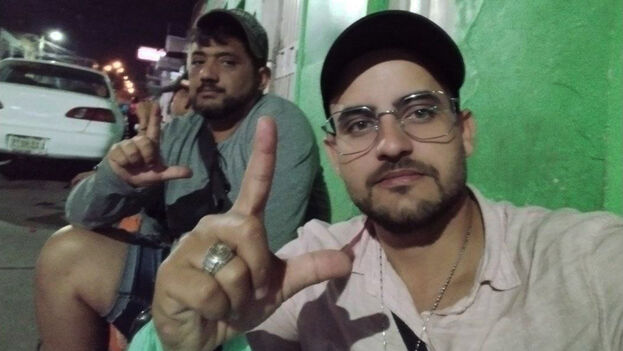
![]() 14ymedio, Ángel Salinas, Mexico, 4 July 2022 — A few days before the first anniversary of the July 11 (11J) protests, doctor Alexander Pupo Casas, who suffered from harassment and lost his job due to his outspoken stance against the Cuban regime, tells 14ymedio: “As I see it, there won’t be another one because that 11J, 12J and 13J* the people came out civilly and peacefully and received repression, beatings and jail for it.”
14ymedio, Ángel Salinas, Mexico, 4 July 2022 — A few days before the first anniversary of the July 11 (11J) protests, doctor Alexander Pupo Casas, who suffered from harassment and lost his job due to his outspoken stance against the Cuban regime, tells 14ymedio: “As I see it, there won’t be another one because that 11J, 12J and 13J* the people came out civilly and peacefully and received repression, beatings and jail for it.”
The doctor, originally from Holguín, does not believe that he next demonstration will be “neither peaceful nor civic… There will be deaths and injuries on both sides, it will be a shame.”
Pupo, who shares with his colleague Alexander Jesús Figueredo Izaguirre the journey to reach the United States, uploaded to his Facebook wall a video recorded inside the trunk of a vehicle where he is crowded together with Haitian, Bangladeshi, African, Venezuelan migrants, Chinese and Russians.
“Look where we had to travel. Gentlemen, this is incredible, but nothing, here we are, in the trunk of a bus,” he is heard saying while panning the camera to show more people. “And there were those who said that we were financed, that we were well paid by the CIA.”
The doctor tells 14ymedio that they have had “a few days of calamities but right now we are safe.” Pupo reserved his location for a security issue “since the State Security Directorate (DSE) has tried to find our location, God knows with what intention.”
Pupo and Figueredo have had to experience, like thousands of Cubans who leave the Island, the most difficult emigration: without visas, without the support of diplomats, practically without money. “Our entire journey has been like illegals. We have been detained by the police, they have taken money from us and left us dumped in the middle of nowhere. We have had bad times.”
“They crossed the Darién jungle, they faced the Panamanian guard, we were sent to a UN ‘concentration camp’ in Panama, we have been denied medical assistance when we have needed it. In short, we had to face the dark side of emigration alone.”
In May, Figueredo said that on this journey “a part of him died in the Darién jungle seeing lost children, drowned and dead people and without being able to do anything, just watch and continue.”
The doctor points out that in the group in which they were traveling “unfortunately we had seven or eight deaths.” To enter that area that extends along the border between Panama and Colombia, not only “you have to be physically and mentally prepared, but luck also plays a crucial role in getting out of there. No one gets out unscathed.”
According to official figures from the National Migration Service (SNM) of Panama, until last March: a total of 13,425 irregular migrants crossed the Darién, including 4,257 from Venezuela, 1,589 from Haiti, 1,164 from Senegal and 1,065 from Cuba.
Pupo and Figueredo hope to reach the United States in a month and announced that they will notify the press when they are “at the border.”
*Translator’s note: The protests began on July 11th and continued over the following days.
____________
COLLABORATE WITH OUR WORK: The 14ymedio team is committed to practicing serious journalism that reflects Cuba’s reality in all its depth. Thank you for joining us on this long journey. We invite you to continue supporting us by becoming a member of 14ymedio now. Together we can continue transforming journalism in Cuba.
